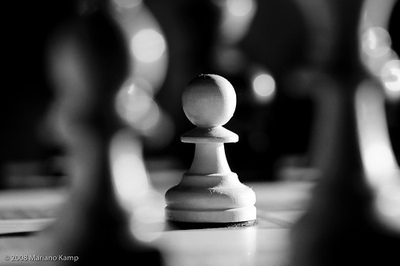By Luke Kristopher Davis
GENES
The process which tends to sieve out those not-so-good genes is natural selection of the Darwinian kind. In an environment there is food to consume, dangers to avoid, tasks to complete and mating to be done. An organisms genes provide most of its tools to complete these, if an organism fails it is normally due to a deficiency in its genes. This organism either reproduces less or doesn't at all, over time this deficient gene eventually dies away and the more dominant genes survive. This is a very tenuous and complicated process but evolution is basically the survival of more adapted genes for certain organisms in specific environments.
Nature has created it's very own game. Genes are the players, wanting to prolong and play for the longest and the game is survival. The only way they can win is to possess the most useful and successful biological information.
In Richard Dawkin's 'The Selfish Gene' he explains with clarity and scientific depth the phenomenon of evolution and the 'selfish' character that genes seem to play.
IDEAS
We are still joyrides for genes in their huge complicated game. However we have ourselves, due to our genes and social infrastructure, evolved to become very complicated and intelligent creatures. We have surpassed our cousins and those of other branches of the animal kingdom to become creatures who reason, imagine, debate, question our own nature and our own universe and invent.
Our language and our brain cognition have helped us as a species rise in front, but we have had to install another huge tool to help accelerate our intelligence and our social world. This tool is culture. I do not just mean culture in the traditional sense i.e. art, classical music, poetry and Latin. I mean culture in all of its social glory; recorded language, organised politics, religion (in its infancy), music, fiction, art and of course science, invention and capitalism.
Culture itself has become an emergent organism. I say this not in the meta-physical sense: culture is not a floating system of invisible human connections it is very much grounded physically. Through recorded language, systematized information (video, music.. everything) and the education of people have helped keep culture alive... keep it breathing. Like us as organisms evolving from an ape-like ancestor to a more efficient human, our culture is evolving too and it could be said it is doing so at a faster rate.
Each biological organism as we know has the gene playing the game of evolution. What molecule is playing the game for the complicated organism of culture? Ideas. Ideas. Ideas. They are the key to the adaptation of culture.
Ideas are very hard to define. I mean they could be defined as specific neuron firings from reading language... but that doesn't tell us much at the moment. We could say ideas are specific, they are communicated through language and they represent actions, explanations, emotions, processes and plans.
What we know about ideas is that they are units, they stand on there own in a certain sense. For example the idea of the light bulb or the idea of Inception stand apart but like genes they carry trails of history behind them, not genetic history but social and cultural history. The analogy between the c-organism and the bio-organism at times is amazingly interesting.
THE C-GAME
Richard Dawkins originated the idea (haha yes an idea!) of the meme. A unit of cultural information which in a sense is any idea which exists in a culture. He argued that the meme acts like the gene in the sense that it wants to survive and thrive.
The meme does not die out due to certain physical environmental pressures, the memes survival depends collectively on humans. A meme develops overtime from other memes or it arises spontaneously and chaotically e.g. Einsteins special relativity (it was not predictable but it has rough links to Galileo and other intellectual work). Developing memes sometimes die out due to it being initially rejected by a collection of people, this meme may have not fitted the fashion of the day, it may have been too contentious, not useful enough or just plain destructive.
In the past the meme of equality of race began developing, it was rejected by some majorities in american culture and other cultures. It still gradually became more prominent and then went into a frenzy (taking over culture). This meme succeeds because it is 1) reasonable 2) represses a destructive meme (racism and discrimination) 3) gives physical freedom to those in ethnic minorities. These three reasons gave the meme enough time and dedication to spread, develop and ingrain itself in our moral identities.
Another meme that has had a famous and quite difficult past is evolution. Evolution was proposed by many biologists but it began to fully develop as a theory when Charles Darwin began to carry this meme. He himself adapted the meme using observation and reason. He then published it (a great tool for a memes survival). This meme however contradicted another meme which was then at the top of its game: Religion. It contradicted religion as it states that the creation is a myth and that humans are not special creatures. Evolution became rejected. Although many scientists took to it and began fighting for it. After time, research and increased debate and literature evolution has become scientific fact in most western cultures. It has succeeded because it agrees with nature, it works and it is useful. Still in the American culture the evolution meme is still battling with religion and fundamentalism.
An example of an everyday meme could be that you propose to your friends that you should go bowling one night. You develop this meme by finding out how much it costs etc. and you back this meme up by saying how fun it will be. Some friends reject it and replace it with another meme entirely, some do not wish to partake and others mould your original meme to a different destination or they add a night clubbing meme to it . This shows how memes start and how they try to survive, sometimes they get rejected in total and other times they are slightly adapted to fit the group. This sounds like evolution right? It is but on a more complicated console, the game is everywhere.
There are some memes which we will call super-memes. Super-memes are those ideas which hold a big share of the culture market. They literally have the ability to change the game itself. In the past and in parts still in the future a great example of a super-meme is fundamentalism. Fundamentalism is the idea that one should believe in something forever without denial.
It literally changed the game for memes, if a meme went against another meme which was believed fundamentally by a big majority then it had no chance. So only memes which fitted the super-meme kept surviving. Religion is the son of the fundamentalism meme, so is terrorism and sexism. However there are always gaps in the game for small players to try and develop. Science and the idea of logic and evidence developed greatly and began growing, it has battled the super-meme of fundamentalism for centuries. Now it is itself a super-meme in the c-organism. Science has become a successful meme not because of power, indoctrination, threat of eternal punishment or the illusion of infallibility. It has become successful because it works, it helps us live healthier, longer and allows us to become more intelligent about the universe around us.
Science has changed the game so that a meme that proposes nonsense becomes discarded, a meme that proposes a rational plan or idea to help science itself or to help humankind will win.
It is an interesting meme. Will the theory of memes survive? Will it adapt the c-organism?
It really is up to us.
Just remember that nature is one big game and we are playing in it. We may think we write the rules but never forget we are always playing.















